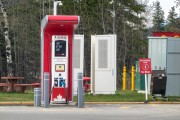I want a medal for dedication. Saturday I gave up skiing in two feet of glorious sun-drenched snow to crowd inside Metro Hall for a public roundtable hosted by Metrolinx to debate how best to raise public dollars to fund transit expansion — one of a series of consultations currently taking place across the Toronto and Hamilton region.
 The question of whether to fund transit now seems a foregone conclusion to the 160+ residents who joined me on Saturday, sleeves rolled up to debate how. Toronto has some of the worst traffic in North America yet is currently one of the few cities without revenue strategies to fix the problem. Foot stomping against big bad taxes and tolls is now completely out of step with growing sentiment.
The question of whether to fund transit now seems a foregone conclusion to the 160+ residents who joined me on Saturday, sleeves rolled up to debate how. Toronto has some of the worst traffic in North America yet is currently one of the few cities without revenue strategies to fix the problem. Foot stomping against big bad taxes and tolls is now completely out of step with growing sentiment.
The Toronto business community has been advocating for transportation revenue tools for years, and now too is Premier Kathleen Wynne, who promises to tackle congestion as a top priority and implement pricing strategies to fund transit in the GTHA.
Even Mayor Rob Ford relented, committing City Hall to its own city-centric toll-and-tax pondering process called Feeling Congested, an online and town hall campaign that intends to pipeline into the bigger Metrolinx strategy tank.
Unfortunately two years ago he cancelled the city’s vehicle registration tax, which was a short-sighted action to pledge solidarity with cars, while compromising long-term investment in a better quality of life for drivers and transit riders alike. As one participant at my working table noted: “I supported getting rid of the tax at first, but a lousy $60 in my pocket isn’t worth the lost collective revenue that could have gone to funding transit.”
Few medals for the non-dedicated
Low fanfare for the VRT may have to do with the fact that money collected was dumped into general revenue — an act which in itself was a lost opportunity. Lesson to the province and municipalities: regardless of the specific pricing tools under consideration — sales tax, tolls, parking levies, etc. — it is absolutely critical that funds raised are dedicated to rapid transit.
Of equal necessity is communicating clearly to the public that these funds are dedicated — before and after they are introduced — and demonstrating results.
Ultimately, support may be won or lost not so much on the menu of pricing options, but on how it is served up to the public.
Championing public support
A recent study by the Pembina Institute found that while over half of drivers surveyed in the GTHA were willing to pay a road toll, sales tax or parking fee, support levels soared for pricing policies that are fair, transparent and dedicated to building rapid transit in the region.
- 70% of drivers surveyed were more willing to pay a user fee on a highway or road if they could see the results in the form of new rapid transit built in the GTA.
- 69% were more willing to pay a user fee on a highway or road if it the fee was dedicated to building new rapid transit that connected their community with a broader rapid transit system in the GTA.
- 69% would find a road toll more acceptable if the funds were fully dedicated to building a rapid transit line close to this same route.
The survey also found that drivers would choose telecommuting if the opportunity existed, and would leave the car at home if they could purchase car insurance on a pay-as-you-drive basis. These options are some sweet carrots that could be served along with those dry pricing sticks.
Reaping the rewards
For many drivers in the Toronto area, there is no reasonable alternative to commuting to work by car. The Pembina survey shows there is very strong support among drivers for road tolls and other user fees, as long as those funds are used to build or expand rapid transit options in areas where people currently have no choice but to drive.
As the Canadian Urban Transit Association points out, public transit delivers a threefold return on investment. Public revenues are likely safer in building transit infrastructure than investing in mutual funds. Not to mention averting a potential $15 million stuck-in-traffic cost per year for not investing.
Then we can all be winners.







